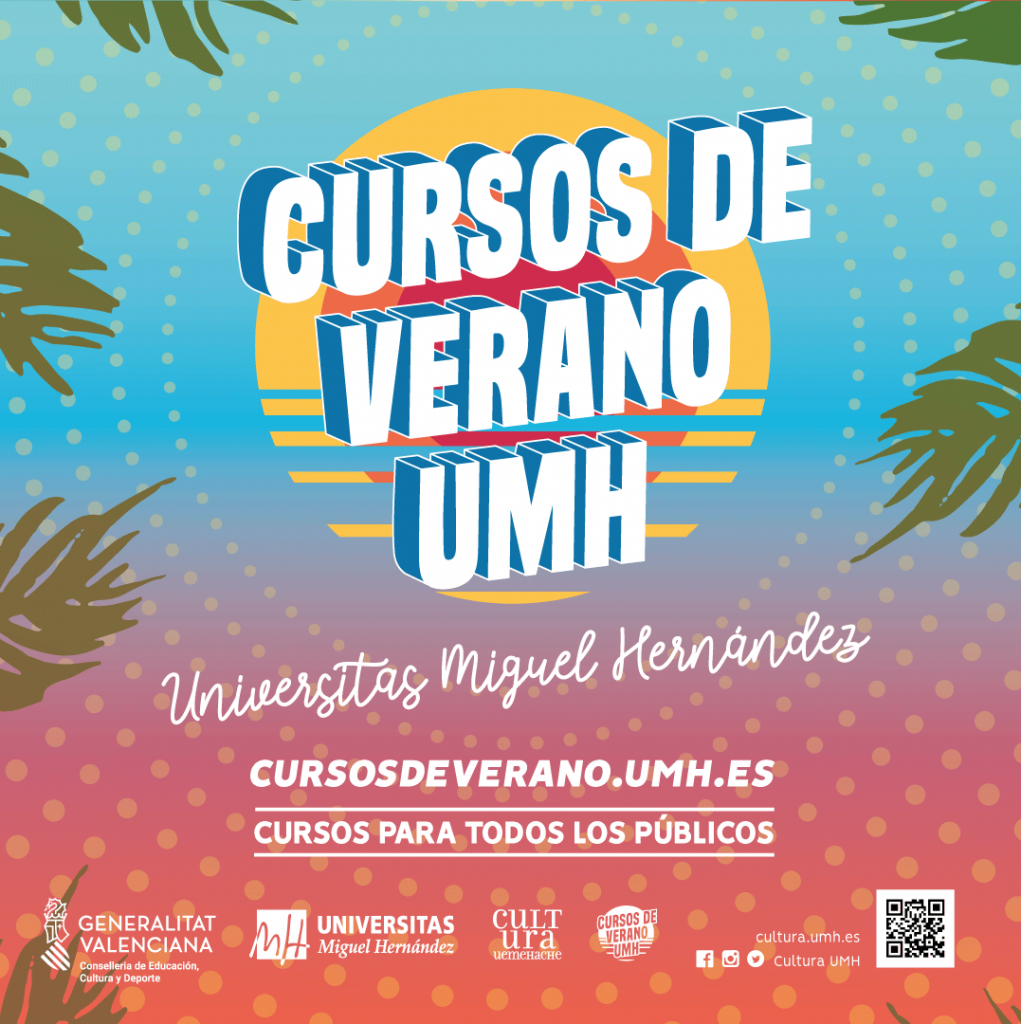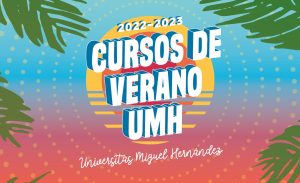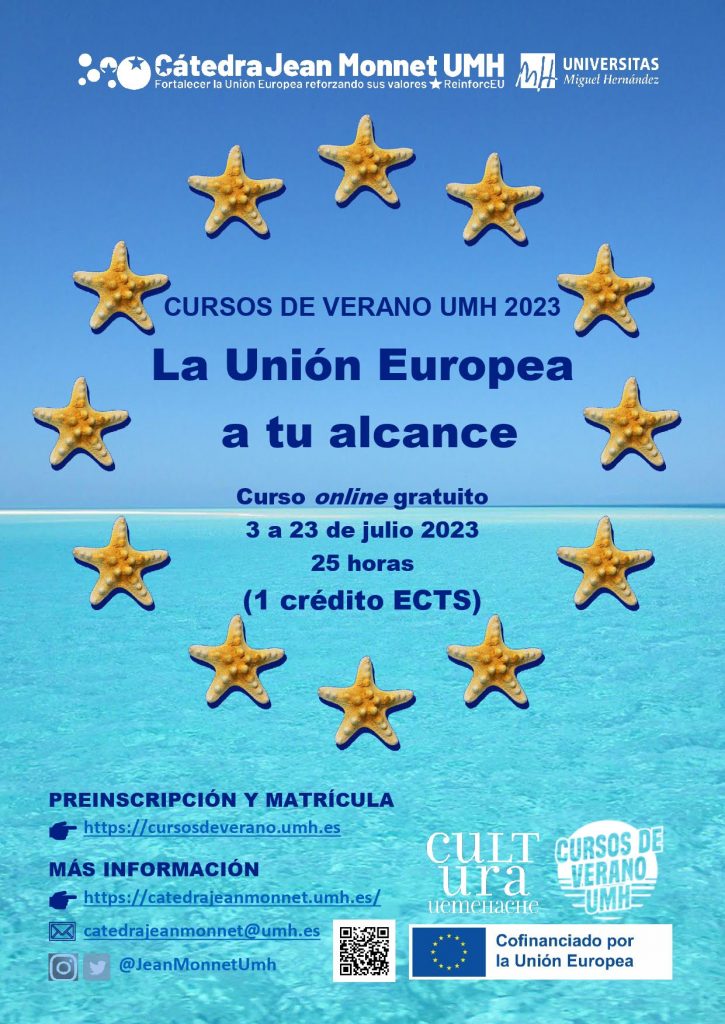SUMMER COURSES
THE EUROPEAN UNION AT YOUR FINGERTIPS

The UMH Jean Monnet Chair “Strengthening the European Union by reinforcing its values (ReinforcEU)” of the Area of Public International Law and International Relations of the University Miguel Hernández organizes, with the grant of the European Union the SUMMER COURSE: THE EUROPEAN UNION AT YOUR FINGERTIPS
FORMAT: The course will be taught online and will take place from 8 to 21 of July 2024.
TARGET AUDIENCE: By its nature the Course is offered to different sectors of society. It is aimed, on the one hand, at university students (Bachelor, Master and PhD) not only of degrees such as Law, DADE, ADE, Political science, Journalism… more used to these subjects, but also and especially to students of Science or Engineering, or other disciplines that do not usually include in their curricula the knowledge of the European Union and its functioning, including the students of AUNEX. On the other hand, the course is open to other sectors of the public who, for different reasons, are interested in better understanding the European Union and knowing what their rights as citizens are, the mechanisms provided by the Union to make such rights effective and what it may be their role as citizens in defining the future of the Union and in maintaining and developing its values (high school teachers, members of NGOs and associations, lawyers and prosecutors, government officials, journalists, opponents…).
OBJECTIVES: The main objective of the Course is to promote among citizens a greater knowledge about the European Union and, more specifically, about the position of the citizen within it, about their rights and freedoms and about the mechanisms that the Union itself makes them available to exercise them effectively and to participate in the democratic life of the European Union directly and indirectly. The aim is to promote the active and committed participation of citizens in the life of the European Union, in defining its future development and in maintaining and strengthening its values of dignity, freedom, democracy, equality, the rule of law and respect for human rights, including the rights of persons belonging to minorities. Ultimately, the aim is to bring the European Union closer to the citizens and the citizens to the European Union. It is also intended to provide students with the necessary bases to be able to continue expanding and deepening their knowledge about the European Union autonomously, being able to search, obtain and select information appropriately. It is also intended to promote critical analysis and reflection based on the knowledge acquired, developing the ability to make critical judgments on the reality of the European Union that allow developing an active role in society and in the democratic life of the European Union.
TEACHING AND PROGRAMMING: The Course directed by Prof. Dra. Elena Crespo Navarro, Associate Professor of Public International Law and International Relations at the Miguel Hernández University and Jean Monnet Chair Holder, has the participation of professors specialized in the different subject matter of the course, coming from different Spanish Universities.
METHODOLOGY: Eminently practical, combining the conference/round table format with the more practical seminar/workshop format and self-learning modules.
MAIN TOPICS OF THE COURSE:
I.- Democracy, the rule of law and the protection of fundamental rights and freedoms in the European Union.
II.- The EU citizenship status (freedom of movement and residence in the Member States, consular assistance abroad, petition to the European Parliament, complaint to the European Ombudsman, complaint to the Commission, access to documents).
III.- Border control, asylum and immigration in the European Union.
STRUCTURE AND ACTIVITIES: The course consists of two round tables and two modules that will be taught live on the dates and times indicated (but will be recorded and available to students during the course development) and eight self-learning modules, which will be open and available to students throughout the course.
I.- ROUND TABLES: The sessions will be broadcast live and recorded to be available to the students during the development of the course.
1. Round table 1: Live through Google Meet.
2.Round table 2: Live through Google Meet.
II.- LIVE MODULES: The sessions will be recorded and will be available to the students during the development of the course.
1. The European Union at your service and the access to the European civil service.Prof. Dr.Fernando Lozano Contreras, Lecturer in Public International Law and International Relations at University of Alcalá.
2. The prohibition of discrimination in the European Union.Prof. Dr. Millán Requena Casanova, Associate Professor of Public International Law and International Relations at University of Alicante.
III.- SELF LEARNING MODULES
1. Your rights before the European Courts. Prof. Dr. Francisco Pascual Vives, Associate Professor of Public International Law and International Relations at the University of Alcalá.
2. Your rights before the European Courts: discussion of selected cases. Prof. Dr. Laura Aragonés Molina. Assistant Lecturer in Public International Law and International Relations at the University of Alcalá
3. Non-discrimination on grounds of gender and on sexual orientation and gender identity in the European Union.
– Prof. Dña. Adela Rodríguez Mañogil, Assistant Professor in Public International Law and International Relations at the Miguel Hernández University.
– Prof. Rocío M. Pozo Tomás, Asociate Lecturer in Public International Law and International Relations at the Miguel Hernández University .
4. Your European citizenship rights: freedom of movement and residence within the territory of EU Member States. Prof. Dr. Elena Crespo Navarro, Associate Professor of Public International Law and International Relations at Miguel Hernández University.
5. Your European citizenship rights: consular assistance abroad. Prof. Dr. Elena Crespo Navarro, Associate Professor of Public International Law and International Relations at Miguel Hernández University.
6. How to exercise your rights in the European Union. Prof. Dr. Elena Crespo Navarro, Associate Professor of Public International Law and International Relations at Miguel Hernández University.
7. Guarantees at the service of citizens: the European Ombudsman and the petition to the European Parliament. Dña. Alessandra Nasoni, Honorary collaborat or of the Area of Public International Law and International Relations at the Miguel Hernández University.
8. The European Union and immigration. Prof. Dr. Carolina Soler García. Lecturer in Public International Law and International Relations at the University of Alicante.
REGISTRATION IS FREE and a certificate will be delivered to the participants.
More information: http://cursosdeverano.umh.es/
Registration: From 27 th April to 7th July HERE
NOTE: The opinions and points of view expressed in the Course only commit their authors and do not necessarily reflect those of the European Union or the European Education and Culture Executive Agency (EACEA). Neither the European Union nor EACEA can be held responsible for them.
The Course is part of the 25th edition of the UMH Summer Courses of the University ‘s Vice Rectorate of Culture.


The UMH Jean Monnet Chair “Fortalecer la Unión Europea reforzando sus valores (ReinforcEU)” of the Area of Public International Law and International Relations of the University Miguel Hernández organizes, with the grant of the European Union the SUMMER COURSE: THE EUROPEAN UNION AT YOUR FINGERTIPS
The Course is part of the 24th edition of the UMH Summer Courses of the University ‘s Vice Rectorate of Culture

FORMAT: The course will be taught online and will take place from 3rd to 23rd if July 2023.
TARGET AUDIENCE: By its nature the Course is offered to different sectors of society. It is aimed, on the one hand, at university students (Bachelor, Master and PhD) not only of degrees such as Law, DADE, ADE, Political science, Journalism… more used to these subjects, but also and especially to students of Science or Engineering, or other disciplines that do not usually include in their curricula the knowledge of the European Union and its functioning, including the students of AUNEX. On the other hand, the course is open to other sectors of the public who, for different reasons, are interested in better understanding the European Union and knowing what their rights as citizens are, the mechanisms provided by the Union to make such rights effective and what it may be their role as citizens in defining the future of the Union and in maintaining and developing its values (high school teachers, members of NGOs and associations, lawyers and prosecutors, government officials, journalists, opponents…).
OBJECTIVES: The main objective of the Course is to promote among citizens a greater knowledge about the European Union and, more specifically, about the position of the citizen within it, about their rights and freedoms and about the mechanisms that the Union itself makes them available to exercise them effectively and to participate in the democratic life of the European Union directly and indirectly. The aim is to promote the active and committed participation of citizens in the life of the European Union, in defining its future development and in maintaining and strengthening its values of dignity, freedom, democracy, equality, the rule of law and respect for human rights, including the rights of persons belonging to minorities. Ultimately, the aim is to bring the European Union closer to the citizens and the citizens to the European Union. It is also intended to provide students with the necessary bases to be able to continue expanding and deepening their knowledge about the European Union autonomously, being able to search, obtain and select information appropriately. It is also intended to promote critical analysis and reflection based on the knowledge acquired, developing the ability to make critical judgments on the reality of the European Union that allow developing an active role in society and in the democratic life of the European Union.
TEACHING AND PROGRAMMING: The Course directed by Prof. Dra. Elena Crespo Navarro, Associate Professor of Public International Law and International Relations at the Miguel Hernández University and Jean Monnet Chair Holder, has the participation of professors specialized in the different subject matter of the course, coming from different Spanish Universities.
METHODOLOGY: Eminently practical, combining the conference/round table format with the more practical seminar/workshop format and self-learning modules.
MAIN TOPICS OF THE COURSE:
I.- Democracy, the rule of law and the protection of fundamental rights and freedoms in the European Union.
II.- The EU citizenship status (freedom of movement and residence in the Member States, consular assistance abroad, petition to the European Parliament, complaint to the European Ombudsman, complaint to the Commission, access to documents).
III.- Border control, asylum and immigration in the European Union.
STRUCTURE: The course consists of two round tables and two modules that will be taught live on the dates and times indicated (but will be recorded and available to students during the course development) and eight self-learning modules, which will be open and available to students throughout the course.
ACTIVITIES:
I.- ROUND TABLES: The sessions will be broadcast live and recorded to be available to the students during the development of the course.
1. Round table 1: Live through Google Meet. July 3rd (Monday) 11:00 a.m. Títle: The European Union’s common immigration and asylum policy. Speakers: Prof. Dr. Valentín Bou Franch, Professor of Public International Law and International Relations of the University of Valencia and Prof. Dr. Jaume Ferrer Lloret, Professor of Public International Law and International Relations at University of Alicante. Moderator: Prof. Dr. Elena Crespo Navarro, Associate Professor of Public International Law and International Relations at the University Miguel Hernández.
2. Round table 2: Live through Google Meet, July 19th (Wednesday) 11:00 a.m. Title: Values and rights in the European Union. Speakers: Prof. Dr. Araceli Mangas Martín, Professor of Public International Law and International Relations at the Complutense University of Madrid, Full Member of the Royal Academy of Moral and Political Sciences of Spain and Prof. Dr. Carlos Jiménez Piernas, Professor of Public International Law and International Relations at the University of Alcalá. Moderator: Prof. Dr. Elena Crespo Navarro, Associate Professor of Public International Law and International Relations at University Miguel Hernández.
II.- LIVE MODULES: The sessions will be recorded and will be available to the students during the development of the course.
1. The European Union at your service and the access to the European civil service. July 5th (Wednesday) 10.00 a.m., Prof. Dr. Fernando Lozano Contreras, Lecturer in Public International Law and International Relations at University of Alcalá.
2. The prohibition of discrimination in the European Union. July 6th (Thursday) 17.00 p.m., Prof. Dr. Millán Requena Casanova, Associate Professor of Public International Law and International Relations at University of Alicante.
III.- SELF LEARNING MODULES
1. Your rights before the European Courts. Prof. Dr. Francisco Pascual Vives, Associate Professor of Public International Law and International Relations at the University of Alcalá.
2. Your rights before the European Courts: discussion of selected cases. Prof. Dr. Laura Aragonés Molina. Assistant Lecturer in Public International Law and International Relations at the University of Alcalá
3. Non-discrimination on grounds of sexual orientation and gender identity in the European Union. Prof. Dña. Adela Rodríguez Mañogil, Assistant Professor in Public International Law and International Relations at the University Miguel Hernández.
4. Your European citizenship rights: freedom of movement and residence within the territory of EU Member States. Prof. Dr. Elena Crespo Navarro, Associate Professor of Public International Law and International Relations at the University Miguel Hernández.
5. Your European citizenship rights: consular assistance abroad. Prof. Dr. Elena Crespo Navarro, Associate Professor of Public International Law and International Relations at University Miguel Hernández.
6. How to exercise your rights in the European Union. Prof. Dr. Elena Crespo Navarro, Associate Professor of Public International Law and International Relations at the University Miguel Hernández.
7. Guarantees at the service of citizens: the European Ombudsman and the petition to the European Parliament. Dña. Alessandra Nasoni, Honorary Collaborator of the Area of Public International Law and International Relations at the University Miguel Hernández.
8. The European Union and immigration. Prof. Dr. Carolina Soler García. Lecturer in Public International Law and International Relations at the University of Alicante.
REGISTRATION IS FREE and a certificate will be delivered to the participants.
More information: http://cursosdeverano.umh.es/
Registration: From 11th May HERE
NOTE: The opinions and points of view expressed in the Course only commit their authors and do not necessarily reflect those of the European Union or the European Education and Culture Executive Agency (EACEA). Neither the European Union nor EACEA can be held responsible for them.
Information will be available shortly…
